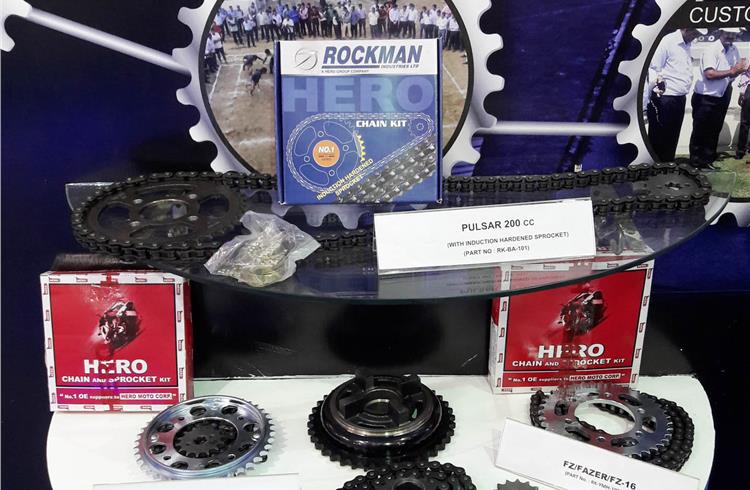Rockman acquires majority stake in Moldex Composites; enters carbon composites business
This acquisition flags off Rockman Industries' strategy to be a frontrunner in fast emerging lightweighting technologies.
In a bid to be ready with next-generation materials as regulatory norms evolve, Hero Group company Rockman Industries has acquired a majority stake of 51 percent worth Rs 100 crore in carbon composites company Moldex Composites.
A Gujarat-based Indo-British joint venture in design and manufacturing, Moldex Composites provides advanced carbon composites to F1 racing cars. This acquisition flags off Rockman’s strategy to be a frontrunner in the fast emerging technologies.
“Our investment into the carbon composites technology is aimed at pre-empting the global shift towards carbon fibre in automobiles besides an entry into motorsports and aerospace. The move is also a part of our diversification strategy aimed at a turnover of Rs 5,000 crore by 2021. Carbon composites are expected to account for 10 percent of Rockman Industries turnover in the next 5 years,” said Suman Kant Munjal, CMD of Rockman Industries.
Rockman will initially target exports that will comprise almost 95 percent of the total products from Moldex’s existing facility located within the special economic zone at Surat. These will be supplied to the US and Europe with the focus being on motorsports, the aerospace sector and high-end automobiles. For instance, BMW’s i8 hybrid sedan uses a lot of carbon composites in its body structure to make it lightweight. Later, Moldex will tap opportunities that will arise in the local market from the offset clauses related to located manufacturing in the aerospace sector. It is expected that carbon composites, which are still an expensive material, will take 5-7 years to percolate down to mainstream automobiles. At present, 85 percent of the body structure of F1 racing cars is made of carbon composites to make them lightweight.
Meanwhile, to expand its overseas reach, Rockman is setting up a sales office in UK to promote carbon composites with another office to come up in the US within three months for sales, marketing and technical support to this business stream. “We are looking at partnering with global leaders in Europe and USA for carbon composites,” said Ujjwal Kant Munjal, executive director of Rockman Industries.
Research and development will be involved in tweaking the existing carbon composite material to suit mass usage in automobiles, for which advanced technologies will have to be procured from global markets.
In quest of lightweighting
Carbon composites are very lightweight, around 25 percent that of teel and 50 percent of aluminium, and can be moulded in any shape. What’s driving the focus on weight reduction are increasingly stringent regulatory norms, emission regulations such as CAFÉ standards and a growing movement towards electric and hybrid vehicles.
Carbon composites save weight and raise vehicle performance, while also providing flexibility in design with the ability to optimise performance and load bearing capacities. They have a much superior strength-to-weight ratio than steel or aluminium. Since composite materials offer a significant rise in performance over metal in any application where mass is important, global demand for composite structures is rising dramatically.
“Carbon composites are replacing conventional aluminium alloys and steel components in aerospace, motorsports, automobiles, medical and defence applications. These composite materials ensure reduction in complete lifecycle costs, not only due to their lower weight but also longer life reducing down-time of whatever they are fitted to. The advantages of composites are lower weight, higher performance, good fatigue, good corrosion resistance and their ability to be readily formed into complex shapes and fully integrated structures with less capital expenditure in tooling. A typical carbon composite would provide the same strength as steel or aluminium with one-fourth of the weight of steel and half the weight of aluminium,” added Ian Thomson, co-founder, Moldex Composites.
Founders of Moldex Composites, Parag Rajda and Robert Neumann are of the opinion that their partnership with the Hero Group would help them in gaining scale and reach this technology for mass production faster and more efficiently.
Rockman plans to invest about 30-40 percent of its planned Rs 500 crore investment over the next 2 years on strengthening its carbon composites business and will also set up a new green field facility for it once the Surat plant capacity is exhausted. At present it is utilising 60 percent of its production capacity.
RELATED ARTICLES
Bosch hydrogen engine tech-powered truck to be on Indian roads this year
The global supplier of technology and services is betting big on both electromobility and hydrogen. While announcing the...
IIT Bombay inaugurates Arun Firodia Research Floor
IIT Bombay, one of India’s top technical and research institutions, honours Kinetic Group chairman Dr Arun Firodia, one ...
Maruti Suzuki expands capacity at Manesar plant by additional 100,000 units
New assembly line at Plant A expands total manufacturing capacity at the Manesar plants to 900,000 units per annum. Alon...





 By Shobha Mathur
By Shobha Mathur
 09 Jan 2017
09 Jan 2017
 10840 Views
10840 Views









